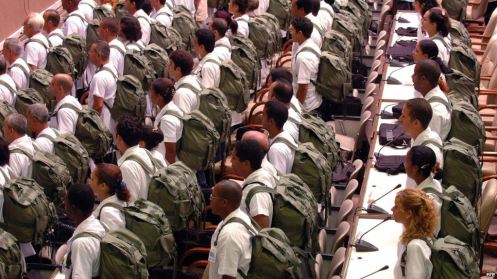
Juan Juan Almeida, 5 January 2018 — The Cuban government plans to implement as soon as possible a group of measures aimed at reducing the number of health workers who work as non-physicians and desert from missions abroad.
According to information obtained by Martí Noticias, the authorities of the Ministry of Public Health (MINSAP) issued a resolution that must be consulted and approved by all provincial and municipal directors and deputy heads of Public Health, Medical Assistance and Collaboration Departments.
The circular makes it very clear that the highest incidence of deserters from Cuban medical aid postings abroad are those who are not working in posts directly related to healthcare delivery,” said a source linked to MINSAP from Havana.
The document confirms the country’s top management level of concern regarding the increase in the desertions of the workers (who are not doctors) from the missions, or who, during the missions, focus on arranging individual contracts with the intention of earning money, and providing services that are not even related to healthcare.
The two-page circular was leaked from emails sent to the heads of the provincial health directorates, and could soon become an addendum to Resolution No. 279/2014, which regulates the “Procedure for the development of the availability of human resources that provide medical and health services abroad.”
The measure reflects the need of the Cuban government to increase control over those collaborators (not physicians) who have already completed work abroad, in order to prevent them from repeating missions.
The reactions have not been long in coming from within Cuba.
“So from now on, before preparing each file for the personnel who will travel abroad to support the collaboration from non-medical specialties, we will be required to have a more rigorous control. The idea is to reduce the number of these types of workers, to prevent those who have already done so from traveling abroad again, and thus to cut off the relations they were able to establish during their earlier stay abroad,” said a source consulted by Martí Noticias.
During 2016, the Cuban economy received income from the ‘leasing’ of professional services abroad, mainly health, that totaled over $11.5 billion in US dollars, a figure that far exceeded the estimated income from tourism, which contributed $2.8 billion to the national economy.
“The medical mission is one of the fundamental programs of Cuban public health, it is part of our principles of solidarity, it greatly helps to sustain the country’s economy, it offers a bonus that benefits the volunteer and, above all, it is the basis for the training of better professionals,” added the interviewee. “But every defection or flight, represents a concern for the Cuban authorities because white-coat diplomacy is also an effective tool for political influence.”
Among the restricted data that have escaped into the public domain is the peculiarity that, before the document becomes a resolution, several collaborators of non-medical specialties have shown their dissatisfaction by raising complaints through letters addressed to José Ramón Machado Ventura, second secretary of the Communist Party and vice president of the Council of State and Ministers that serves the Health sector.
More than 50,000 Cuban collaborators currently serve in 67 countries, about 25,000 of whom are doctors.
